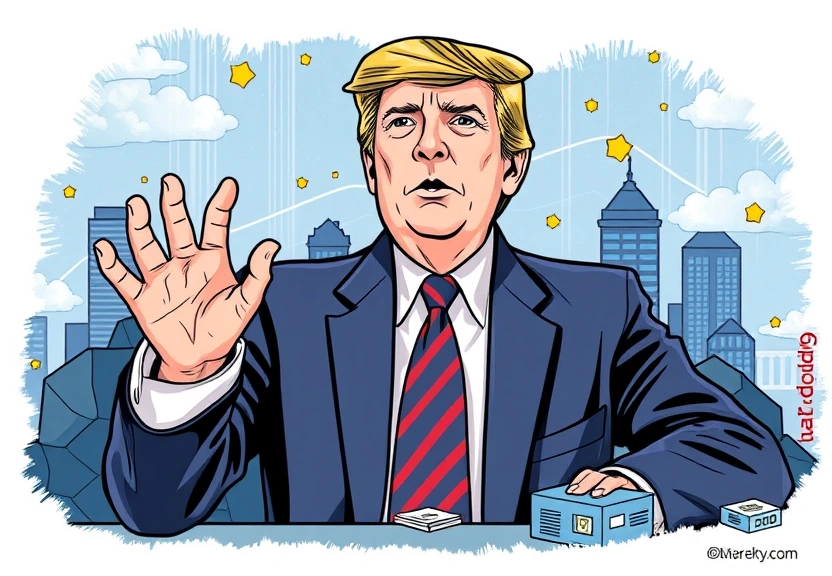Trump’s CFTC Nominee Declares Blockchain a Game-Changer for Society
In a bold proclamation that could reshape the landscape of finance and technology, Brian Quintenz, President Trump’s nominee to lead the Commodity Futures Trading Commission (CFTC), has stated that blockchain technology is poised to impact every facet of society. His remarks come at a critical juncture as the world grapples with the need for clear cryptocurrency regulations. Quintenz’s insights highlight the transformative potential of blockchain, urging Congress to take decisive action in establishing a regulatory framework that supports innovation while safeguarding the interests of consumers and investors alike.

The Rise of Blockchain Technology
Blockchain technology, originally developed as the backbone for cryptocurrencies like Bitcoin, has evolved into a versatile tool that offers numerous applications beyond digital currencies. Its decentralized nature ensures transparency, security, and efficiency, making it an attractive solution for many industries. Quintenz believes that the implications of blockchain extend far beyond finance; they could redefine sectors such as supply chain management, healthcare, real estate, and even governance.
By leveraging blockchain, organizations can streamline processes, reduce fraud, and enhance trust among stakeholders. This has led to increased interest from both private companies and public institutions in exploring how blockchain can be integrated into their operations. Quintenz’s viewpoint reflects a growing consensus that embracing this technology is not just an option but a necessity for future progress.
The Need for Clear Crypto Regulations
Despite the promising potential of blockchain, the lack of clear cryptocurrency regulations remains a significant barrier to its widespread adoption. According to Quintenz, lawmakers must prioritize the establishment of a coherent regulatory framework to provide clarity for businesses and protect consumers. Currently, the regulatory environment is fragmented, with different states and agencies offering varying guidelines, which creates confusion and uncertainty in the market.
Quintenz advocates for a collaborative approach between Congress and regulatory bodies to devise legislation that not only nurtures innovation but also addresses the risks associated with crypto trading and investment. This includes measures to combat fraud, enhance consumer protection, and ensure the stability of the financial system. By laying down clear rules, lawmakers can foster an environment conducive to blockchain development while mitigating potential pitfalls.
Quintenz’s Vision for the Future
As Trump’s CFTC nominee, Quintenz envisions a future where blockchain technology is seamlessly integrated into the economy, driving efficiency and transparency. He believes that the potential for blockchain to revolutionize various sectors means that stakeholders from all industries need to engage in discussions about its implications and opportunities. From financial institutions to technology firms, collaboration will be key to unlocking the technology’s full potential.
Moreover, Quintenz emphasizes the importance of education and public awareness regarding blockchain and cryptocurrency. Many consumers remain unaware of how these technologies work and their potential benefits. By fostering a better understanding through educational initiatives, Quintenz believes that individuals can make informed decisions, paving the way for more widespread acceptance and integration of these innovations in everyday life.
Challenges Ahead
While the future looks promising, there are several challenges that Quintenz and the CFTC will need to address. One of the foremost issues is the rapid pace of technological advancement in the blockchain space, which often outstrips the ability of regulatory frameworks to keep up. This can lead to gaps in oversight and potential exploitation by bad actors in the cryptocurrency market.
Additionally, the global nature of blockchain presents unique regulatory challenges, as different countries approach cryptocurrency regulation in varying ways. This creates a patchwork of regulations that can complicate compliance for businesses operating across borders. Quintenz will need to advocate for international cooperation among regulators to ensure that the benefits of blockchain can be realized while maintaining robust safeguards.
Conclusion
Brian Quintenz’s nomination as the head of the CFTC comes at a pivotal moment for blockchain technology and cryptocurrency regulation. His declaration that blockchain is a game-changer for society reflects a growing recognition of its transformative potential across various sectors. However, to harness this potential fully, clear and coherent cryptocurrency regulations must be established. As Quintenz steps into this critical role, the industry and consumers alike will be watching closely to see how he navigates the challenges ahead and champions the cause of innovation in this rapidly evolving space.
“`
